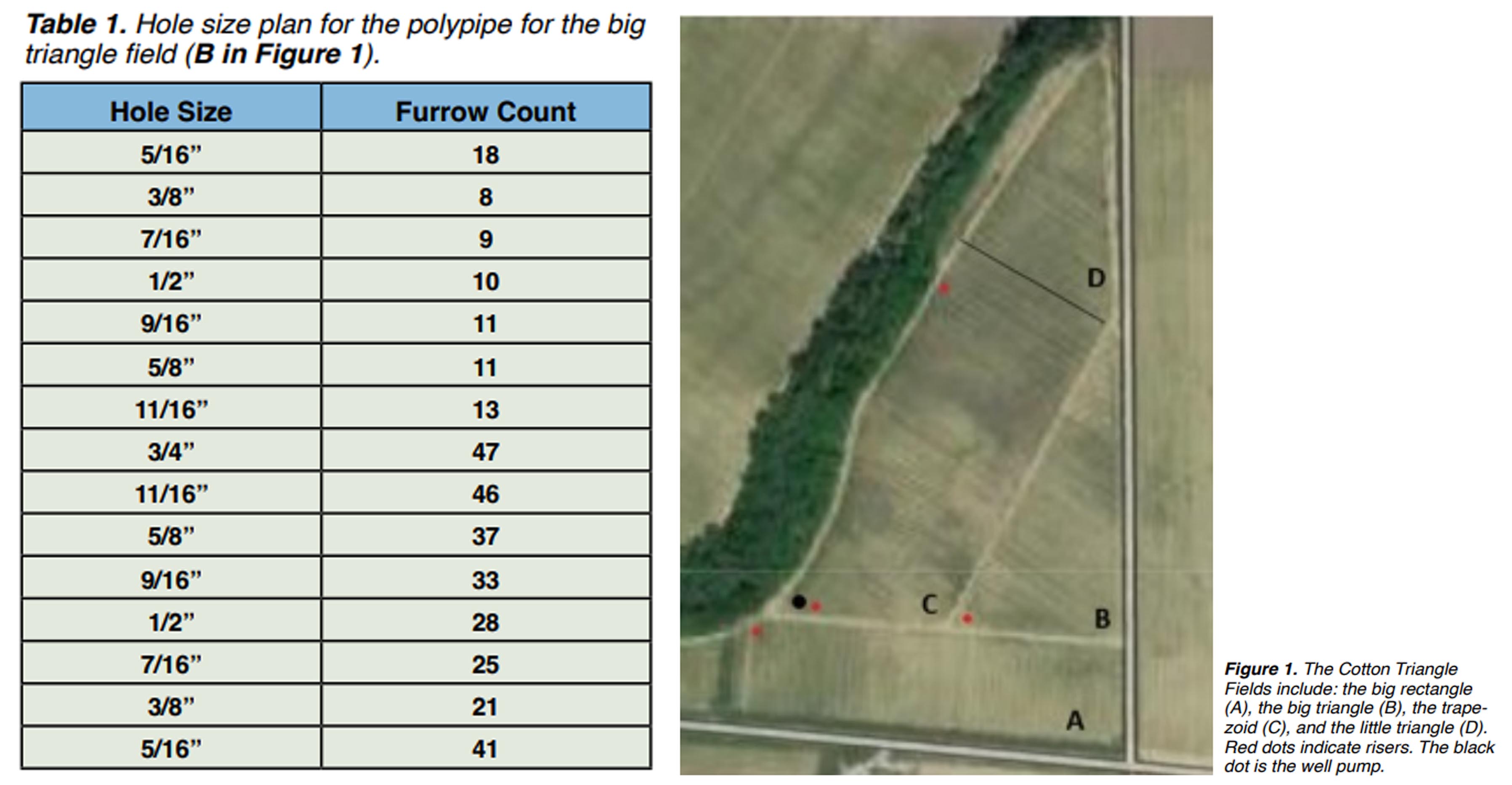Research Project
Determining how polypipe hole size and field shape impacts cotton water use and yield
Investigators: Amanda Nelson
Date: 2022
Project Summary
Introduction
Programs such as the Delta Plastics Pipe Planner Program were designed to create efficient irrigation plans under an array of field shapes using variable hole sizes in polypipe irrigation. However, little is known about how these irrigation plans impact water-use efficiency and crop yield. Therefore, the objective of this study was to determine the effectiveness of this program on water-use and cotton yield from regular and irregularly shaped fields.
Materials and Methods
The site consists of four fields located in Washington County, Mississippi (33.429777, -90.948461) at the corner of Old Leland Rd and Potter Rd (Figure 1) at the NCAAR West Farm facility. Fields were planted with Delta Pine 1646 at 40" row spacing. The big rectangle and triangle (A and B in Figure 1) were irrigated according to the Delta Plastics Pipe Planner Program. The rhombus and little triangle (C and D in Figure 1) were irrigated under a "business as usual" plan to represent a plan that a farmer would use to irrigate similar fields in the Lower Mississippi Delta.
Each length of polypipe had its own flow meter (one per riser, plus one additional length using a T-pipe on the riser between the two rectangle fields). The rhombus and little triangle (C and D in Figure 1) utilized two risers, dividing the field into two. The southern end used one size hole in the polypipe until the field starts to taper, at which point it was tied off and the pipe from the second riser used (creating the little triangle). The pipe from the second riser used two sizes of holes; 3/8" for 135 rows, 7/16" for the remaining rows until the field started to taper again (~280 rows), then back to 3/8" for the remainder. The big rectangle (Figure 1A) used two hole sizes, per the Delta Plastics Pipe Planner output; 1/2" for 165 rows and 9/16" for the remaining ~230 rows. The triangle (B in Figure 1) used the hole size plan in Table 1. Water was applied 7-10 days after the last rainfall until the longest rows were wetted.
Results/ Current Status
In 2022, cotton was planted the end of June, putting this study about three weeks behind the recommended date the region. Three irrigation events were conducted during the year in accordance to the standards outlined in the Delta Plastics Pipe Program design, however late rains and technical difficulties (polypipe blowouts) limited the ability to meet the original objectives. However, preliminary results show that Pipe Planner used an average of 26% less water on the triangular fields. Therefore, initial results are very promising for improved cotton water use under the Delta Plastics Pipe Planner Program.
The project was adapted mid-year to additionally investigate the efficacy of the Goanna Ag sensors (Queensland, Australia). The Goanna GoField comprehensive system integrates field sensor data, satellite imagery, and integrated algorithms that provides critical information for making field specific, precise irrigation scheduling decisions, thereby reducing water use and increasing water use efficiency. Preliminary results revealed issues with infiltration of irrigation water through this monitoring system. The comprehensive system will be fully implemented in the 2023 season.
Cottonseed was sampled for quality in November 2022, but harvesting did not occur until late December 2023 due to weather. This project will be repeated in the 2023 season, but with the Goanna sensor system guiding irrigation application timing. There is also a post-harvest project planned for these fields for February 2023 to monitor water movement and infiltration with the above pipe designs. This will allow us to better determine irrigation rates and application techniques in the Lower Mississippi River Basin.
Project Photos

Find Research
By Crop Type
By Topic
Contact NCAAR
General Information
Kaye Sullivan
vfs23@msstate.edu
662.390.8510
F:662.390.8501
Showcase Demo
Drew Gholson, Coordinator
drew.gholson@msstate.edu
662.390.8505
Himmy Lo
himmy.lo@msstate.edu
662.390.8509

